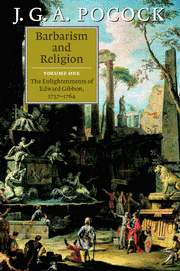Book contents
- Frontmatter
- Contents
- Acknowledgements
- Note on references, quotations and translations
- List of abbreviations
- Introduction
- PART I ENGLAND AND SWITZERLAND, 1737–1763
- PART II THE ENCOUNTER WITH PARIS AND THE DEFENCE OF ERUDITION, 1761–1763
- 6 The politics of scholarship in French and English Enlightenment
- 7 Erudition and Enlightenment in the Académie des Inscriptions
- 8 D'Alembert's Discours préliminaire: the philosophe perception of history
- 9 The Essai sur l'étude de la litterature: imagination, irony and history
- 10 Paris and the gens de lettres: experience and recollection
- PART III LAUSANNE AND ROME: THE JOURNEY TOWARDS A SUBJECT, 1763–1764
- Epilogue: Gibbon and the rhythm that was different
- List of references
- Index
6 - The politics of scholarship in French and English Enlightenment
Published online by Cambridge University Press: 15 December 2009
- Frontmatter
- Contents
- Acknowledgements
- Note on references, quotations and translations
- List of abbreviations
- Introduction
- PART I ENGLAND AND SWITZERLAND, 1737–1763
- PART II THE ENCOUNTER WITH PARIS AND THE DEFENCE OF ERUDITION, 1761–1763
- 6 The politics of scholarship in French and English Enlightenment
- 7 Erudition and Enlightenment in the Académie des Inscriptions
- 8 D'Alembert's Discours préliminaire: the philosophe perception of history
- 9 The Essai sur l'étude de la litterature: imagination, irony and history
- 10 Paris and the gens de lettres: experience and recollection
- PART III LAUSANNE AND ROME: THE JOURNEY TOWARDS A SUBJECT, 1763–1764
- Epilogue: Gibbon and the rhythm that was different
- List of references
- Index
Summary
Two years before Gibbon set out for Paris, and at the mid-point of his militia service, he had published his first printed work, the Essai sur l'étude de la littérature. In later years he pronounced himself disappointed by this short treatise, which he presented as a piece of juvenilia, written and published prematurely, and there is no sign that he saw it as laying down a programme followed in his subsequent writings. There is, however, a good deal to be learned from a close study of the Essai, and in this section of the present work we shall find that it was a considerable achievement for a man in his early twenties, and that it has much to tell us about Gibbon and his times. We already know that it was begun at Lausanne, where he read d'Alembert's Discours préliminaire à l'Encyclopédie; it therefore confronts us, and may be said to have confronted him, with Enlightenment in its paradigmatic form, that laid down by the philosophes and gens de lettres of Paris when they associated themselves to produce the Encyclopédie under the collective signature of ‘une sociètè de gens de lettres’. The Encyclopédie is said to contain a programme of philosophic Enlightenment, and though we may debate both the character of this programme and the question whether it is all the Encyclopédie contains, its presence is hard to deny, if only because it seems to have been widely acknowledged by readers in the second half of the eighteenth century.
- Type
- Chapter
- Information
- Barbarism and Religion , pp. 137 - 151Publisher: Cambridge University PressPrint publication year: 1999
- 1
- Cited by



